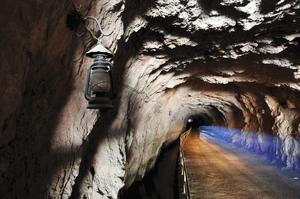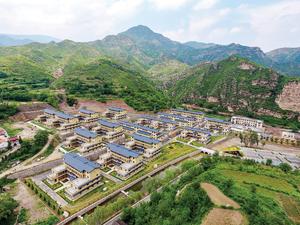 Shanxi’s Lingqiu boasts natural landscapes and cultural legacies such as the ancient structure of Jueshan Temple. Built in 1090, the 13-tier pagoda at the temple is a masterpiece of Chinese classical architecture. (WANG ZHONGXUN / FOR CHINA DAILY)
Shanxi’s Lingqiu boasts natural landscapes and cultural legacies such as the ancient structure of Jueshan Temple. Built in 1090, the 13-tier pagoda at the temple is a masterpiece of Chinese classical architecture. (WANG ZHONGXUN / FOR CHINA DAILY)
Rural tourism development has brought new value to the pristine environment and folk customs of Lingqiu county.
Sitting in the northeast of Datong, North China’s Shanxi province, Lingqiu has focused on integrating local agriculture, nature, cultural heritage and tourism and found a sustainable track out of poverty.
Tourists from Beijing and other parts of Shanxi have flocked to the county’s Chehe Organic Community over the years.
The community, which covers an area of 27 square kilometers, used to be a barren place. In 2013, only 30 out of 200 people lived in the Xiachehe village as part of the community, said Wang Chun, director of the village committee.
“Most of the labor force went outside to find work,” Wang recalled.
“(We have) good mountain, water and air, but we were not able to convince people to stay.” That was when the local government decided to develop organic plantations and animal husbandry operations.
More than 300 farming experts and organic agricultural practitioners were invited to the village, which is now a pastoral idyll, with its lush crops and distinctive, traditionally-designed homestays.
Through no small effort from the villagers, Xiachehe has developed about 40 agricultural products that are certified organic, including eggs and yellow rice.
Many travelers are drawn to the village by its fresh organic produce, ranging from vegetables to mutton, as well as the fresh air and rural lifestyle.
To ensure tourists stay for longer periods, the village has developed exhibition and reception centers, as well as a folk museum and eco-friendly restaurants. Support has been given to locals to build homestays.
 The man-made tunnel through the mountains was Huata village’s only link to the outside world. The village is surrounded by mountains on four sides, some of which boast ancient sections of the Great Wall. (WANG ZHONGXUN / FOR CHINA DAILY)
The man-made tunnel through the mountains was Huata village’s only link to the outside world. The village is surrounded by mountains on four sides, some of which boast ancient sections of the Great Wall. (WANG ZHONGXUN / FOR CHINA DAILY)
Each villager can get 1,000 yuan (US$147) annually from accommodation and catering services, Wang said.
Villagers started to come back home in 2015 when the local economy picked up. In 2017, Xiachehe developed jungle adventure and winter fun programs to spice up traveler experiences.
According to village leaders, Xiachehe welcomed 80,000 tourist visits in 2019, registering profits of more than 250,000 yuan. Per capita income reached 19,000 yuan.
The success of the Chehe Organic Community has inspired Lingqiu to develop similar organic and pastoral communities, which has helped more locals out of poverty and boosted rural transformation.
About an hour’s drive away, Huata village is also reaping the benefits.
“Huata is known for its walnuts and peppers, which we had trouble selling to the outside world before,” said Han Qigou, the village head.
“Now, people can sell these just by sitting out on their doorsteps,” Han said.
It is all thanks to the rise in rural tourism, which has opened sales channels for local produce and encouraged local catering businesses.
Huata is surrounded by mountains on four sides, some of which boast ancient sections of the Great Wall. Rivers run across it and have nurtured various lush fruit trees.
However, with less than a hectare of arable land per capita, the village does not have enough farmland. A man-made tunnel through the mountains was Huata’s only link to the outside world.
“Despite the beautiful scenery, locals were living a tough life,” said Han Qigou, who was elected director of Huata’s village committee in 2016.
 Many travelers are drawn to the Chehe Organic Community for its fresh organic produce, from vegetables to mutton, as well as the fresh air and rural lifestyle. (WANG ZHONGXUN / FOR CHINA DAILY)
Many travelers are drawn to the Chehe Organic Community for its fresh organic produce, from vegetables to mutton, as well as the fresh air and rural lifestyle. (WANG ZHONGXUN / FOR CHINA DAILY)
Han saw Huata’s tourism potential and used some money he made from a delivery business he ran outside the village. He led some of the locals to build fruit- and vegetable-picking gardens, a tourist center and a parking lot in 2014.
Now, Huata has managed to attract travelers keen to experience its leisure offerings and stunning landscape.
“We were receiving more than 100 guests on weekends before the epidemic,” said Sun Zhiqiang, who opened Huata’s first inn after seeing the positive changes take effect in the village.
Although business was affected this year, it has started to see a recovery, Sun said.
Another local villager, Han Fuhu, also returned home a few years ago and built a two-story homestay on the site of his old house and offers visitors a taste of distinctive local cuisine.
Increasing numbers of tourists have boosted sales of local peaches, pears, walnuts and peppers, which has brought an average income to each resident of more than 2,000 yuan.
In the south of Lingqiu county, Beiquan village has not failed to attract visitors since April 2016, when it rolled out an epic performance event that introduces tourists to its rural and agricultural way of life.
Featuring more than 200 villagers, the show uses the surrounding mountains and rivers as its stage background and, among other elements, shows the audience the process of how locals build their homes from the ground up.
In the best of times, more than 40 performances of the show were given to more than 60,000 visitors over the course of two months, said Lin Xinchun, Beiquan village’s Party secretary.
In 2019, the show was adapted to integrate more local cultural elements and the history of King Wuling, a ruler of the Zhao State during the Warring States Period (475-221 BC), packing in both new and returning guests.
To date, lotus flower- and fruit-picking festivals have been staged and help to lure an increasing number of travelers from Hebei, Tianjin and Inner Mongolia autonomous region, according to local village leaders.
Tourism has produced positive results in many villages of Lingqiu, as the county has tapped into its historical sites and natural resources to boost rural development.
So far, a wetland health-preservation resort is taking shape in the east of the county, and a national organic agriculture park is under construction in the south. A military culture park in the west will also be ready for public consumption.
According to the local authority, most of the rural houses, roads and farmlands will be upgraded in order to transform Lingqiu into a grand scenic spot.
Contact the writers at yangfeiyue@chinadaily.com.cn


